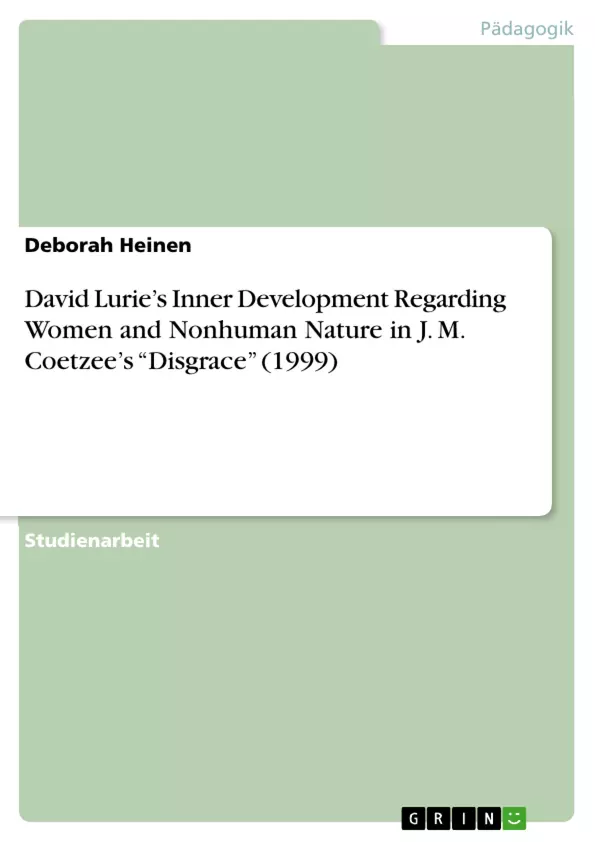The work at hand takes a closer look at J.M. Coetzee’s novel “Disgrace” from 1999 from an ecocritical and ecofeminist perspective. It is paid special attention to the protagonist’s attitude and relationship towards women, the countryside and what he considers as wilderness, and animals.
The main question here is how the protagonist’s attitudes change. So in other words, it is taken a look at how the protagonist’s “new” unfamiliar environment influences his character. First of all, the reader gets a brief summary of the story itself and its narrative style.
In the following chapter the protagonist’s attitude towards women is elucidated. In relation to this, David Lurie’s current crisis of identity is taken into consideration because it might influence his view on women.
The next chapter deals with the difference between rural and urban areas and, in relation to this, the protagonist’s perception of “otherness”. After this it is taken a look at the protagonist’s perception and relation to animals.
Finally, the last chapter contains a conclusion and an answer to the question how the protagonist’s attitudes towards women, nature, and animals changed. Beyond any doubt, read from an ecocritical perspective, “Disgrace” offers many more interesting issues that are worth being worked on.
Inhaltsverzeichnis
-
Introduction
- “Disgrace” – Content and Style
- Summary
- Narrative Perspective
- "He is the one who leads, she is the one who follows" - David Lurie and Women
- “Bread in the oven and a crop in the earth”- Urban vs. Country Life.
- "They can smell what you are thinking” – David Lurie and Animals.
Zielsetzung und Themenschwerpunkte
Diese Arbeit untersucht J.M. Coetzees Roman "Disgrace" (1999) aus einer ökokritischen und ökofeministischen Perspektive. Der Fokus liegt dabei auf der Haltung des Protagonisten David Lurie gegenüber Frauen, der Landschaft und der Wildnis sowie Tieren. Die Arbeit analysiert, wie sich Luries Einstellungen im Laufe der Geschichte verändern und wie seine neue, ungewohnte Umgebung seinen Charakter beeinflusst.
- David Luries Entwicklung im Umgang mit Frauen
- Die Darstellung von Urbanität und Ruralität in "Disgrace"
- David Luries Beziehung zur Natur und zu Tieren
- Die Auswirkungen der Umwelt auf Luries Identität
- Die Rolle der Ökofeminismus in der Analyse des Romans
Zusammenfassung der Kapitel
-
Introduction
Die Einleitung führt in das Thema der Ökokritik ein und stellt die zentralen Fragestellungen der Arbeit vor. Sie beleuchtet die Beziehung zwischen Mensch und Natur aus unterschiedlichen Perspektiven und skizziert die Bedeutung von Umweltfragen in der Literatur.
-
“Disgrace” – Content and Style
Summary
Die Zusammenfassung des Romans "Disgrace" bietet einen Überblick über die Handlung und die wichtigsten Figuren. Der Fokus liegt dabei auf David Luries Geschichte und seinen Erfahrungen im ländlichen Raum.
Narrative Perspective
Dieser Abschnitt analysiert den Erzählstil des Romans. Der Leser erhält Einblicke in die Erzählperspektive und die Charakterisierung des Protagonisten.
-
"He is the one who leads, she is the one who follows" - David Lurie and Women
Dieses Kapitel untersucht die Beziehung zwischen David Lurie und Frauen aus ökofeministischer Sicht. Es werden die Machtstrukturen und Geschlechterrollen im Roman analysiert, die Luries Verhalten gegenüber Frauen prägen.
-
“Bread in the oven and a crop in the earth”- Urban vs. Country Life.
Dieser Abschnitt beleuchtet den Kontrast zwischen städtischem und ländlichem Leben in "Disgrace" und untersucht, wie David Lurie den Wandel zwischen diesen Welten erlebt. Die Arbeit analysiert die Bedeutung von Umwelt und Landschaft in der Geschichte.
-
"They can smell what you are thinking” – David Lurie and Animals.
Dieses Kapitel befasst sich mit David Luries Beziehung zu Tieren und seiner Wahrnehmung von Wildnis. Es analysiert, wie sich Luries Einstellungen gegenüber Tieren im Laufe der Geschichte verändern und wie diese Veränderungen in Verbindung mit seinem Verständnis von Natur stehen.
Schlüsselwörter
Die Arbeit konzentriert sich auf die Themen Ökokritik, Ökofeminismus, "Disgrace", J.M. Coetzee, David Lurie, Geschlechterrollen, Umweltbewusstsein, Mensch-Tier-Beziehung, Urbanität vs. Ruralität, Identität, Veränderung und Umweltverantwortung.
Häufig gestellte Fragen
Worum geht es in J.M. Coetzees Roman "Disgrace"?
Der Roman handelt vom tiefen sozialen Fall des Professors David Lurie im Post-Apartheid-Südafrika und seiner Suche nach Identität in einer neuen Umgebung.
Was ist eine ökokritische Perspektive?
Die Ökokritik (Ecocriticism) untersucht die Darstellung der Beziehung zwischen Mensch und Natur in der Literatur, einschließlich der Rolle von Tieren und Landschaften.
Wie ändert sich David Luries Einstellung zu Tieren?
Während er Tiere anfangs distanziert betrachtet, entwickelt er im Laufe des Romans durch seine Arbeit in einer Tierklinik eine tiefere, fast demütige Verbindung zu ihnen.
Was bedeutet Ökofeminismus im Kontext des Romans?
Der Ökofeminismus zieht Parallelen zwischen der Unterdrückung von Frauen und der Ausbeutung der Natur, was in Luries Verhalten gegenüber Frauen und seiner Umwelt analysiert wird.
Wie kontrastiert der Roman Stadt- und Landleben?
Die Arbeit beleuchtet den Wandel von Luries urbanem Leben in Kapstadt hin zur rauen Realität auf dem Land, die seine bisherigen Werte und seine Identität in Frage stellt.
- Quote paper
- Deborah Heinen (Author), 2015, David Lurie’s Inner Development Regarding Women and Nonhuman Nature in J. M. Coetzee’s “Disgrace” (1999), Munich, GRIN Verlag, https://www.grin.com/document/306699



